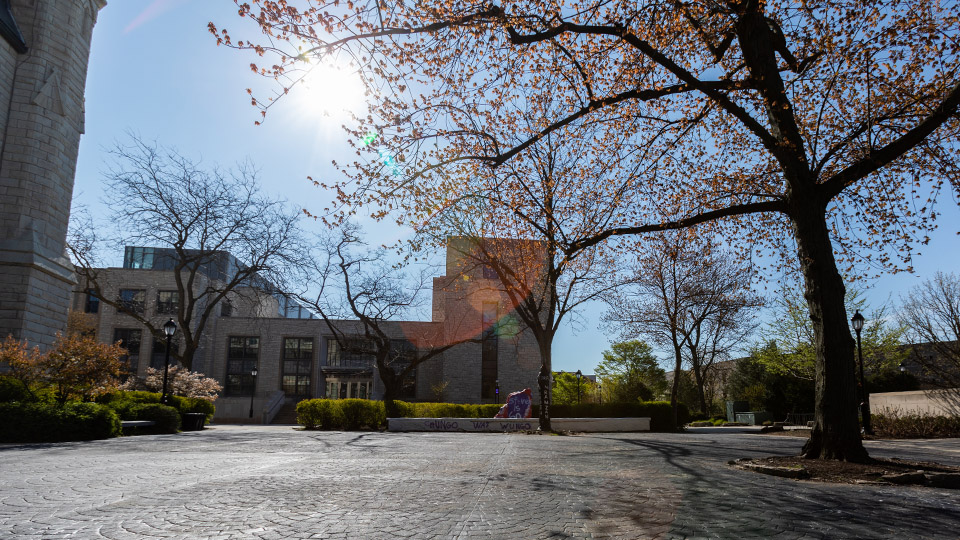College is typically a time of independence and exploration for students — many of whom are away from home for the first time — while parents practice their own new routines.
But COVID-19 has changed everything. While these are challenging times, it’s possible that some might actually emerge stronger, learning new life skills to face the twists and turns of growing up.
That’s the takeaway from two members of the Northwestern community — a third-year Weinberg student and a Northwestern public health scientist who is also a parent — who share with Northwestern Now their personal insights on what it means to live through the pandemic.
Sarah Genelly is a third-year student in the Weinberg College of Arts and Sciences and an intern at Lurie Children’s Hospital where she works with Clarissa Simon, a public health scientist, adjunct professor and Ph.D. graduate of the School of Education and Social Policy and mother of three children. Despite having worked together for a year, the two have never met in person. Now they come together in this Q&A to reflect on the new campus life, relationships and bonus time at home.
What has campus life been like this year?
Genelly: As an upperclassman, I’ve been in Evanston since Fall Quarter. It’s been interesting to reflect on how campus has changed over the last couple of quarters. In the fall, I could walk from my off-campus house to the COVID-19 testing site at the Jacobs Center without seeing anyone. Now there are so many more people, and you can really see it when you walk around Evanston or visit common spaces on campus.
Living off campus with multiple roommates, we all quickly recognized the need to prioritize open and honest conversation about COVID-19 safety expectations and our own comfort levels with exposure through social activities. Those conversations aren’t always easy. But they’re necessary for the sake of everyone around us. Especially in college, when everyone is loosely connected, it’s easy to lose track of how large your pod is getting.
How has your outlook changed as the vaccine continues to roll out?
Genelly: It’s exciting to see the number of students around campus who have been vaccinated. Over the last couple of weeks, many of my friends have received at least the first dose. Being fully vaccinated myself, I haven’t changed much in my day-to-day routine. But it has made me feel more comfortable in seeing friends outside the house or going to public spaces. In addition to the peace of mind, it also makes me hopeful for a more normal — and in-person — academic year next year.
This quarter, the supplement of rapid testing means a lot more flexibility with multiple test results per week. Having those rapid results before a visit to the gym, library or Norris Center might help prevent the spread of the coronavirus. And I think the practice of frequent testing can help set a precedent for individual responsibility throughout the community.
From a parent’s perspective, how have things changed?
Simon: It’s so different this year, but the skills we valued pre-COVID still apply now. It’s always important to validate and listen to our children as they share their challenges and successes. Our family is especially focused on improving communication, emulating what healthy partnerships look like and sharing our anxieties, our trouble concentrating and sleeping and even, at times, our hopelessness. We don’t stigmatize these issues. We try to normalize them and encourage our children to share their own feelings and worries with us, too.
Prioritizing our physical health is important, of course, but it’s impossible to avoid the disproportionate mental health toll of the pandemic on young adults. The vaccine priority groups have been based on physical health conditions, older age and employment status. But it would be useful, too, to prioritize based on one’s mental health and living conditions, which could include college students.
Adulthood is not defined by breaking connections with parents, but rather allowing those connections to develop into more equal partnerships.”
Beyond health, our parenting expectations are that our children should be fairly independent, too. But we also allow them to follow a gradual, winding path to the real world by exploring identities, roles, relationships and career options.
Since so many students have not returned to campus, it can feel like that progress toward independence is stalling. The truth is we expect them to deal with the unanticipated challenges of the pandemic, manage personal and community risk, socialize safely with peers and, on top of all of that, maintain more adult-like relationships with family members who also are struggling, particularly women and mothers.
Can you see a silver lining in the pandemic?
Simon: One advantage of having students remain home is the bonus time parents get with their children to build stronger and more mature relationships, or at least to hear each other out as we all navigate the pandemic together. For the students who may need more emotional support during this transition, they have parents down the hall to serve as the first line of psychological intervention. Adulthood is not defined by breaking connections with parents, but rather allowing those connections to develop into more equal partnerships.


